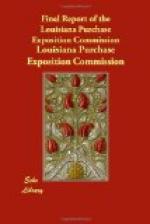“The awards as made by the superior jury are final and binding upon the Exposition Company and the National Commission, except as to any award or awards which are impeached by said company or Commission for fraudulent conduct on the part of said jury in making the award.”
(2) Omit entirely the third clause.
The restrictions thus sought
to be placed upon the investigation
of charges of fraud or misconduct
as proposed by the amendment
were unsatisfactory.
First. Because the impeachment of an award, as construed by your Mr. Knapp’s letter, was to be confined exclusively to the company and the Commission, whereas in the judgment of the Commission any party feeling aggrieved, and having knowledge of the fraud or misconduct complained of, should be permitted to come forward with the charges and proofs.
Second. In confining the investigation of alleged fraudulent conduct to the superior jury alone, the proposed amendment would obviously operate to preclude any inquiry into any charge of fraud or misconduct on the part of any group or department jury or jurors, or any person or persons not connected with the juries, who might, through fraud, bribery, or misrepresentation have illegally or wrongfully influenced or procured an award, the facts concerning which may not have been brought to the attention of the superior jury for investigation.
Third. In confining the investigation to the action of the superior jury your proposed amendment practically precluded the possibility of any investigation, for the reason that the good faith of the superior jury is not regarded by the Commission as open to question, nor has the Commission contemplated as possible any necessity to question the findings of the superior jury on any subject properly and fully presented to, and decided by, that body on the merits.
It has been, and is, the contention of the Commission that fraud or corruption at any stage of the proceedings, whether discovered before or after action by the superior jury, if not investigated and adjudicated by that jury on the merits, should be open to the freest and fullest investigation by the Company and the Commission before final approval of the award.
In conclusion we briefly recapitulate
the following points of
law and fact, which we hold
to be beyond dispute:
First. The law provides
that the appointment of all judges and
examiners for the exposition
shall be approved by the
Commission.
Second. The rules provide that all nominations of group jurors shall be made not later than August 1, 1904, except that nominations made to fill vacancies may be made at any subsequent time.
Third. That the nominations
of jurors were not made to the
Commission prior to August
1, as required by the rules.




